From the Chicago Reader (January 1, 2000). Even though I still (in Spring 2004) don’t understand what the title of this film means, looking recently at the excellent Blu-Ray from New Line Cinema (which includes a feature-length “making of” documentary) has persuaded me that maybe it’s not such a mess after all — and maybe, like the even more underrated Margaret, it needs to be seen more than once. For the time being, at least, I’m prepared to regard it as Paul Thomas Anderson’s best film to date, as well as his most coherent. — J.R.
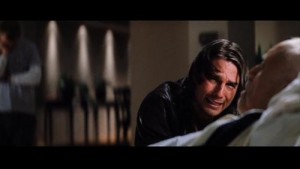
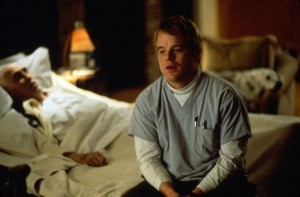
A wonderful mess. Writer-director Paul Thomas Anderson’s third feature (1999), over three hours long, represents a quantum leap in ambition from Hard Eight and Boogie Nights and is much more interesting, though he’s no longer in full command of everything he’s trying to do. He’s handicapped himself with the worst kind of TV-derived crosscutting among his (ultimately interconnected) miniplots. But the movie has a splendidly deranged essayistic prologue (which tries to justify an outrageous climax), the best Tom Cruise performance I’ve ever seen (which, incidentally, is a scorching critique of his other performances), some delicate work by John C. Reilly as a sensitive cop, and provocative material about the unhealthy aspects of hyping whiz kids on TV. Read more
From the Chicago Reader (January 1, 2000). — J.R.
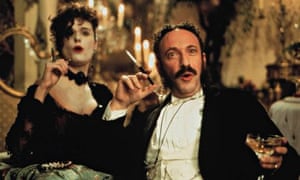
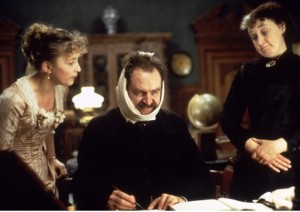
For all his versatility as a writer-director, I was surprised to learn that Mike Leigh (Secrets & Lies) had made a film about the genesis of Gilbert and Sullivan’s mid-1880s comic opera The Mikado. Yet this 160-minute backstage musical is about something he knows intimately — the complex of personal, organizational, artistic, and cultural factors that go into putting on a show. Leigh begins with leisurely character sketches of composer Arthur Sullivan (Allan Corduner) and librettist William Gilbert (Jim Broadbent), two very different men whose collaboration appears to be at an end. Only after Gilbert’s wife (Lesley Manville) drags him to a Japanese exhibition in London does The Mikado (and this movie) begin to take shape, and after that the film keeps getting better and better. The actors and actresses in the stage production, including Leigh regular Timothy Spall, all sing in their own voices, and Leigh’s flair for comedy and sense of social interaction shine as he shows all the ingredients in The Mikado beginning to mesh. Thoroughly researched and unobtrusively upholstered, this beautifully assured entertainment about Victorian England is a string of delights. With Ron Cook, Wendy Nottingham, Eleanor David, Kevin McKidd, Shirley Henderson, Dorothy Atkinson, and many Leigh standbys, including Alison Steadman and Katrin Cartlidge. Read more
From the January 1, 2000 Chicago Reader. — J.R.
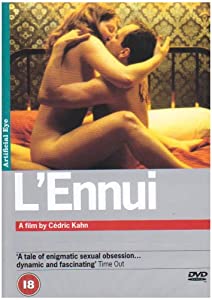
French movies about sexual and romantic obsession may be a dime a dozen, but what’s exceptional about Cedric Kahn’s 1998 film — apart from the fact that it’s a comedy — is its overall sense of sanity. A 40ish philosophy professor (Charles Berling) encounters the chunky, easygoing teenage model (Sophie Guillemin) of a recently deceased painter and starts meeting her for sex on a daily basis; gradually he becomes obsessed with her normality, trying to turn her into a femme fatale. Part of what makes this so funny is Guillemin’s unforced performance, which makes her imperturbable directness as believable as the professor’s neurosis. The sex scenes are fairly explicit, but to his credit Kahn doesn’t allow them to mythologize the characters. With Arielle Dombasle (sporting an uncharacteristic Louise Brooks hairdo) and the late Robert Kramer. In French with subtitles. 122 min. (JR)
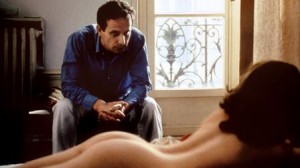
Read more






